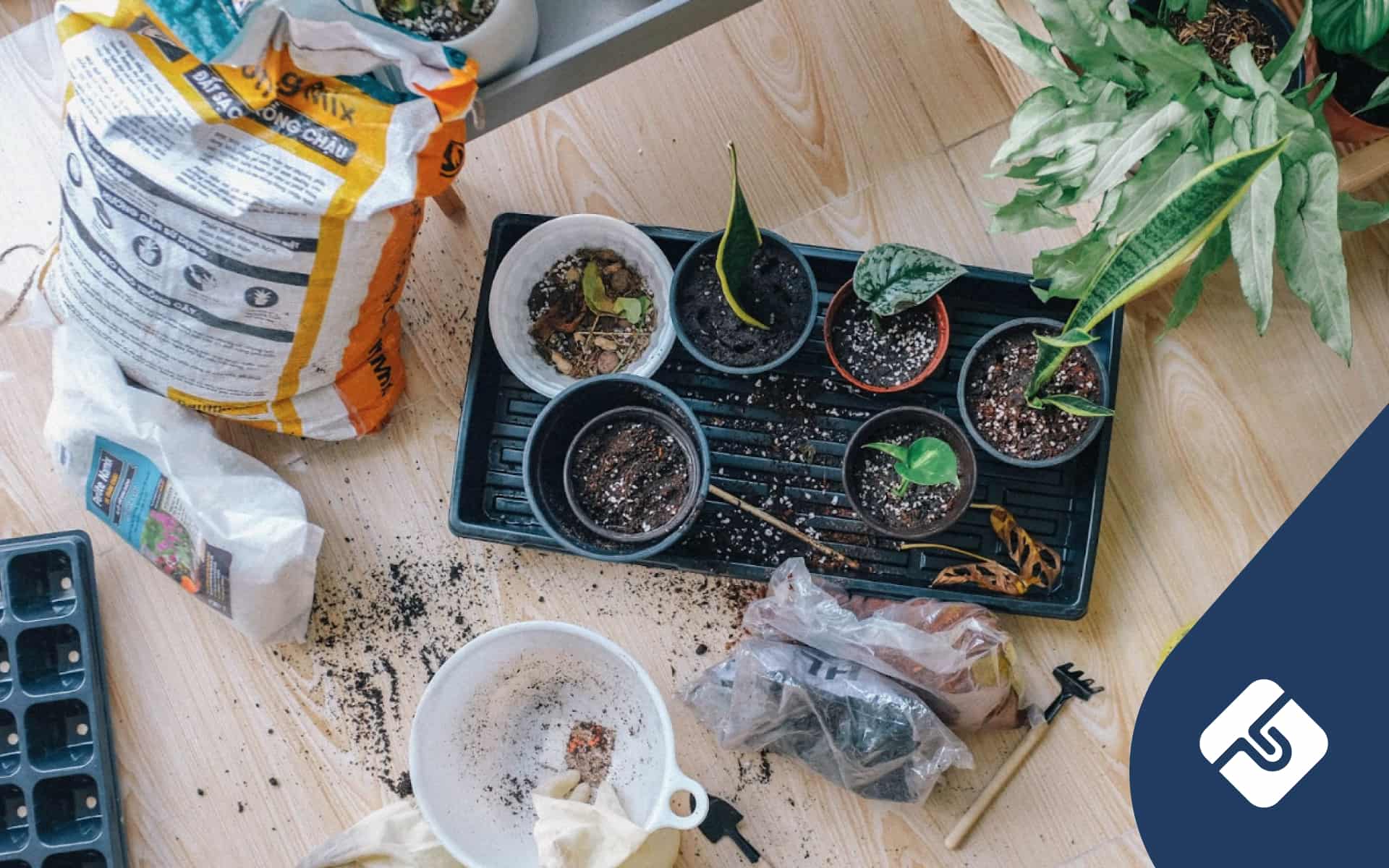Whether you’re passionate about cultivating native Australian plants, eager to supply local landscapers, or dreaming of turning your green thumb into a thriving business, starting a plant nursery in Australia is a rewarding opportunity with plenty of room for growth.
Starting a plant nursery business is a perfect way to pursue your passion for gardening and plants. It can be an exciting opportunity for you to earn income whilst doing what you love! But before you think about even running a business, you need to carefully plan and conduct thorough research.
Ready to turn your passion for plants into a business? Use Lawpath to register your plant nursery in minutes, access essential legal templates, and get the support you need to grow your business with confidence.
Table of Contents
What does a plant nursery business entail?
A plant nursery business grows and sells plants to individual enthusiasts and companies. Some nurseries also grow plants for research and academic study.
Given that many plant species face a growing threat of extinction, plant nurseries can help preserve them by growing them in a controlled environment and making them available for scientific studies and further propagation.
Getting started: The pre-planning steps
Starting a plant nursery business can be a complicated process. Following certain pre-launch steps can help you start your plant nursery.
1. Research
Research on your competitors can help you create a good business plan. A competitor analysis can highlight gaps in supply and demand and where your business can add to the competition.
Research on the planned nursery businesses in your area can also provide insights into plants that are in high demand in your region. Your research can also include plant nursery startup costs and plant nursery profit margins to get an idea of the costs you will encounter in your startup nursery business.
This is a crucial step in order to succeed in the long term. Consider reaching out to existing plant nursery businesses to learn valuable tips and examine which types of plants are currently most in demand. You can ask insightful questions such as:
- What were your biggest struggles when setting up the business? How did you overcome this?
- Is there anything you wish you had done differently when starting up your business?
- What is your number one tip for being successful?
- How did you get your business name out there?
- Who are your competitors at the moment?
- What are normal plant nursery startup costs in your area?
2. Determine your niche
A competitor analysis can help in determining the types of plants offered by your competitors. You can establish your speciality in plants that are rare or in low stock in your locality. For instance, if your locality doesn’t have many rare flower sellers, your nursery can choose to specialise in growing rare flowers.
3. Choose your plant nursery business structure
There are various types of plant nursery businesses. Some may choose to specialise only in certain types of plants, while others may operate on a mail-order basis. Retail nurseries sell primarily to homeowners, compared to wholesale nurseries that sell to landscape contractors, distributors, and retail outlets.
Once you have decided the type of nursery you want to establish, you also need to choose your business structure:
- Sole trader: This can be a low-cost option for an individual running the business. A sole trader and their company are considered the same entit,y and hence they are responsible for the company’s debts and obligations.
- Partnership: A partnership is controlled by two or more people who also share the debts and obligations of the company.
- Company: A company has a complex structure and can legally sue and be sued. In other words, it is a legal entity in itself. Companies are incorporated under the Corporations Act 2001 (Cth) and are governed by the Australian Securities and Investments Commission (ASIC).
4. Create a business plan
Writing a solid nursery business plan is a crucial step when starting any business. You need to map out the specifics of your business and understand your business goals. Grab a pen and a piece of paper and start answering these questions in detail:
- Who is your target market, and how will you reach them?
Your target market will depend largely on the products you sell. You can conduct a consumer analysis in your area to determine consumption trends. You can then advertise your products to your target audience.
- What is the name of your business?
Every business in Australia needs to register for an Australian Business Number (ABN) with a business name to function as a business. You will need to name your business for the same. An ABN also enables you to apply for the Goods and Services Tax (GST) concessions.
- Where will you be located?
Your nursery can be started from your backyard or from a leased store space. Depending on the size of your company, you might also need to rent office space for your business.
- What are your plant nursery startup costs? How will you cover these?
Starting a plant nursery can be expensive. You will need to invest in gardening supplies, fertilisers, soil, equipment, etc. You will need to determine if you will fund the startup costs using your personal savings, take out a loan or find investors to invest in your company.
- Who will be your suppliers?
A plant nursery business will require regular gardening supplies. You can find a supplier in your locality to ensure you have a steady source of supplies. Make sure to sign proper supplier agreements once you have done so.
- What is your business goal? Do you have a mission statement?
A business objective or business goal can help you shape your business. A mission statement can also help consumers decide if they identify with your mission.
- How much will you charge customers for each product?
Determine the right price point for your products. This will depend on the cost of your supplies, the profit margins you’d like to have, and the price set by your competitors. It’s important to be fair and transparent about your pricing.
5. Set up nursery operations and site
A successful plant nursery setup requires careful planning of your physical operations. Here’s how to lay the groundwork for an efficient and productive nursery layout in Australia.
- Choosing the right land: Select land with excellent drainage and plenty of sunlight — most nursery plants need at least 6 hours of direct light daily. Ensure there’s easy vehicle access for deliveries and customer pick-ups.
- Infrastructure essentials: Install greenhouses or shade houses to protect sensitive plants and extend your growing season. Set up a reliable irrigation system, such as drip or overhead watering, before planting.
- Managing plant health and pests: Adopt best practices from the Australian Plant Production Standard (APPS) to monitor for pests and diseases. Use quality potting mix and implement integrated pest management to minimise chemical use.
- Essential equipment: Stock up on basics like shovels, trowels, trays, benches, and labelling tools. Wheelbarrows and carts will help move plants and materials efficiently around your site.
A well-organised plant nursery setup, with the right infrastructure and equipment, forms the foundation for a thriving nursery business in Australia.
6. Launch your business operations
With your physical plant nursery setup in place, it’s time to establish the digital and financial systems that will keep your business running smoothly.
- Point of Sale (POS) systems: For in-person sales, use a user-friendly POS platform like Square, which offers affordable hardware, inventory tracking, and integrated payment processing — ideal for small nurseries and market stalls.
- Inventory management: Track your plant stock, supplies, and sales with digital tools. Airtable provides a flexible, spreadsheet-style database for managing inventory, while Sortly offers visual inventory tracking with barcode scanning. These are helpful for nurseries with a diverse range of plants.
- Accounting and invoicing: Handle your finances efficiently with cloud-based accounting platforms like Xero or MYOB. These tools help you manage invoices, expenses, GST, and payroll, and are well-suited for Australian small businesses.
- Customer Relationship Management (CRM): Maintain customer records and nurture repeat business with tools like HubSpot CRM (free for basic features) or Mailchimp for email marketing and customer updates.
By integrating these digital and financial tools into your nursery operations, you’ll streamline daily tasks, improve customer experience, and set your business up for sustainable growth in the Australian market.
7. Get your pricing and finances right
Running a plant nursery business in Australia involves navigating low nursery profit margins and seasonal fluctuations in demand. That’s why it’s important to develop a clear plant nursery pricing strategy and manage your finances carefully.
Setting wholesale vs retail prices
Wholesale prices should cover your production costs while allowing for a reasonable margin, typically lower than retail but with higher volume sales. Meanwhile, retail prices factor in additional costs like marketing, customer service, and overheads.
Research local market rates and competitor pricing to position your nursery competitively.
Tracking costs per unit
Accurately calculate the cost of each plant by including soil, water, pots, labour, transport, and packaging. This detailed cost tracking helps identify where you can optimise expenses and set prices that maintain profitability.
Managing cash flow in the off-season
Plant nurseries often face seasonal volatility, with slower sales in colder months. Effective nursery cash flow management involves budgeting for these periods, maintaining reserves, and exploring off-season sales or diversification opportunities to stabilise income.
8. Source employees
Your company will also require employees to manage clients, and load, store and ship goods. Employees might also help with bookkeeping, cleaning, packaging, etc. You need to determine if you want to hire casual, part-time or full-time employees for your business.
- Part-time employees: Part-time employees generally work for less than 38 hours a week. They can still receive some employment benefits, such as sick leave or annual leave on a pro-rata basis.
- Full-time employees: Full-time employees work consistently for fixed pay, subject to change at the employer’s discretion. Generally, full-time employees receive a wide variety of employment benefits such as sick leave, health insurance, etc.
- Independent Contractors: Independent contractors are freelancers or individuals who offer their services for a fixed period of time to a company for a fixed price.
Here is a webinar on how to hire the right employees for your business.
https://www.youtube.com/watch?v=kYV6NYJETBI&ab_channel=Lawpath
9. Market your nursery
A strong marketing plan is essential for selling plants in Australia and building a loyal customer base. Here are practical, results-driven plant nursery marketing ideas to help your business stand out.
Instagram and visual content tips
Instagram is a powerhouse digital marketing tool for plant nurseries thanks to its visual nature.
- Prioritise short-form video content like Reels, which generates higher reach and engagement.
- Use the 50/30/20 content strategy: 50% educational (plant care tips, seasonal advice), 30% community (team stories, customer features), and 20% promotional (specials, new arrivals).
- Consistency is key — schedule posts in advance and use high-quality images to showcase your plants and nursery setup.
- Share behind-the-scenes stories and highlight the growers behind your plants to build trust and loyalty.
Email marketing and loyalty programs
- Collect customer emails at checkout or through your website, then send regular newsletters featuring plant care tips, exclusive offers, and event invitations.
- Launch a simple loyalty program. You can offer discounts or freebies for repeat purchases to encourage return visits and word-of-mouth referrals.
- Use tools like Mailchimp for email campaigns and Square Loyalty for easy-to-manage rewards.
Partnerships with local businesses
In addition to using digital tools, build relationships with local landscapers and offer wholesale pricing or exclusive varieties to become their preferred supplier.
You can explore opportunities to supply to major retailers like Bunnings or participate in their local supplier programs. Plus, make sure to attend or exhibit at garden expos and community markets to connect with new customers, showcase your expertise, and network with industry professionals.
Understand your legal and compliance obligations
Operating a plant nursery in Australia requires strict adherence to a range of legal and regulatory requirements. Understanding and meeting these obligations is crucial to avoid penalties, protect your business, and ensure the long-term success of your nursery.
Local council approvals and zoning requirements for plant nurseries
Before establishing your business, you must secure the appropriate development consent from your local council. This involves confirming that your chosen site is zoned for commercial or agricultural use, as residential zones often restrict nursery operations.
Councils may also require environmental assessments to address issues such as water usage, runoff, and waste management, especially if your nursery is located near sensitive ecosystems.
You can find the most relevant details here:
- Australian Business Licence and Information Service (ABLIS) – Find all permits and zoning requirements for your location.
- NSW Planning Portal – For development consent and zoning in New South Wales.
- VIC Planning Portal – For zoning and planning in Victoria.
- QLD Development Application Portal – For Queensland zoning and planning.
- SA Planning Portal – For South Australia.
- WA Department of Planning, Lands and Heritage – For Western Australia.
- TAS Planning Portal – For Tasmania.
- NT Development One Stop Shop – For Northern Territory.
- ACT Planning and Land Authority – For the Australian Capital Territory.
Chemical handling licenses
If your nursery business involves the use or sale of pesticides, herbicides, or fertilisers, you are required to obtain the relevant chemical handling licenses. This includes registering for a Permit for Agricultural or Veterinary Chemicals, which ensures the safe storage, handling, and application of regulated substances.
The following state government portals provide detailed information on how to apply for these permits:
- Australian Pesticides and Veterinary Medicines Authority (APVMA) – National chemical registration and permits.
- NSW EPA Chemical Licensing
- VIC Agriculture Chemical Use
- QLD Chemical Licences
- SA Chemical Licences
- WA Chemical Use
- TAS Chemical Licences
- NT Chemical Licences
- ACT Chemical Use
Biosecurity plant regulations and compliance
Nurseries must comply with the Biosecurity Act 2015, which governs the movement, propagation, and sale of both native and exotic plant species. This includes adhering to strict biosecurity protocols to prevent the spread of pests and diseases, particularly when importing or exporting plants.
You may need to implement plant health management plans and participate in regular inspections. For certain protected native species, a biodiversity conservation licence may also be required under state legislation.
Get more details for each state here:
- Department of Agriculture, Fisheries and Forestry: Biosecurity – National biosecurity plant regulations and requirements.
- NSW Biosecurity
- VIC Plant Biosecurity
- QLD Plant Biosecurity
- SA Plant Health
- WA Plant Biosecurity
- TAS Plant Biosecurity
- NT Plant Biosecurity
- ACT Biosecurity
Nursery license Australia
Depending on your business activities and location, you may need a specific nursery license to process, store, or sell plant products.
For example, in NSW, a license from the NSW Food Authority is required for handling fresh produce. Meanwhile, you’ll need Plant Breeder’s Rights for new plant varieties.
Other legal considerations
- If you plan to propagate or export plants, check if you need artificial propagation approvals or Plant Breeders’ Rights for new varieties.
- Ensure compliance with workplace health and safety laws, employment contracts, and privacy policies if collecting customer data.
- Maintain clear refund and customer service policies to meet consumer law obligations.
The Australian Business Licence and Information Service (ABLIS) provides tailored lists of requirements for nursery licenses in Australia depending on your specific niche and business plan. Getting the right licensing ensures you remain compliant with all biosecurity plant regulations, chemical handling standards, and zoning requirements for plant nurseries.
Common pitfalls to avoid
Launching a nursery comes with unique plant nursery business risks and operational hurdles. Avoiding these common mistakes will help you build a more resilient and profitable business:
- Not researching plant demand: Failing to understand what customers want can leave you with unsold stock and wasted resources. Thorough market research is critical to avoid this challenge of running a plant nursery.
- Underestimating setup time: Many new owners overlook how long it takes to prepare land, install infrastructure, and establish healthy plant stock. Rushing the process can lead to costly setbacks.
- Poor inventory rotation: Neglecting to rotate and track inventory can result in overgrown, unsellable plants and lost revenue. Effective inventory management is essential for the nursery’s profit margin.
- Ignoring seasonal variations: Not planning for seasonal demand changes can lead to cash flow issues during slow periods. Smart nursery cash flow management helps you weather these fluctuations.
Addressing these plant nursery business risks early will set your nursery up for long-term success.
FAQ
Can I start a nursery from home?
Yes, you can start a plant nursery from home, provided you comply with local council zoning and obtain a home nursery license if required.
Many successful small nurseries begin as backyard operations, but be sure to check your state’s regulations on plant sales and business activities.
How much money do I need to start a nursery?
Startup costs vary, but you can often start a small home-based nursery with as little as $500–$1,000. Larger operations will require more investment for land, greenhouse equipment for plant nursery needs, and infrastructure.
Careful budgeting and tracking are key to achieving a positive nursery profit in Australia and managing risk as you grow.
Launching a legally compliant nursery business
While this may seem like a lot of steps, the result will be worth it. Once you get through the nitty gritty of planning, you’ll have a clear idea of how to start a nursery business.
If you’re still unsure, you also have the option of hiring a lawyer using Lawpath – we are with you every step of the way!








